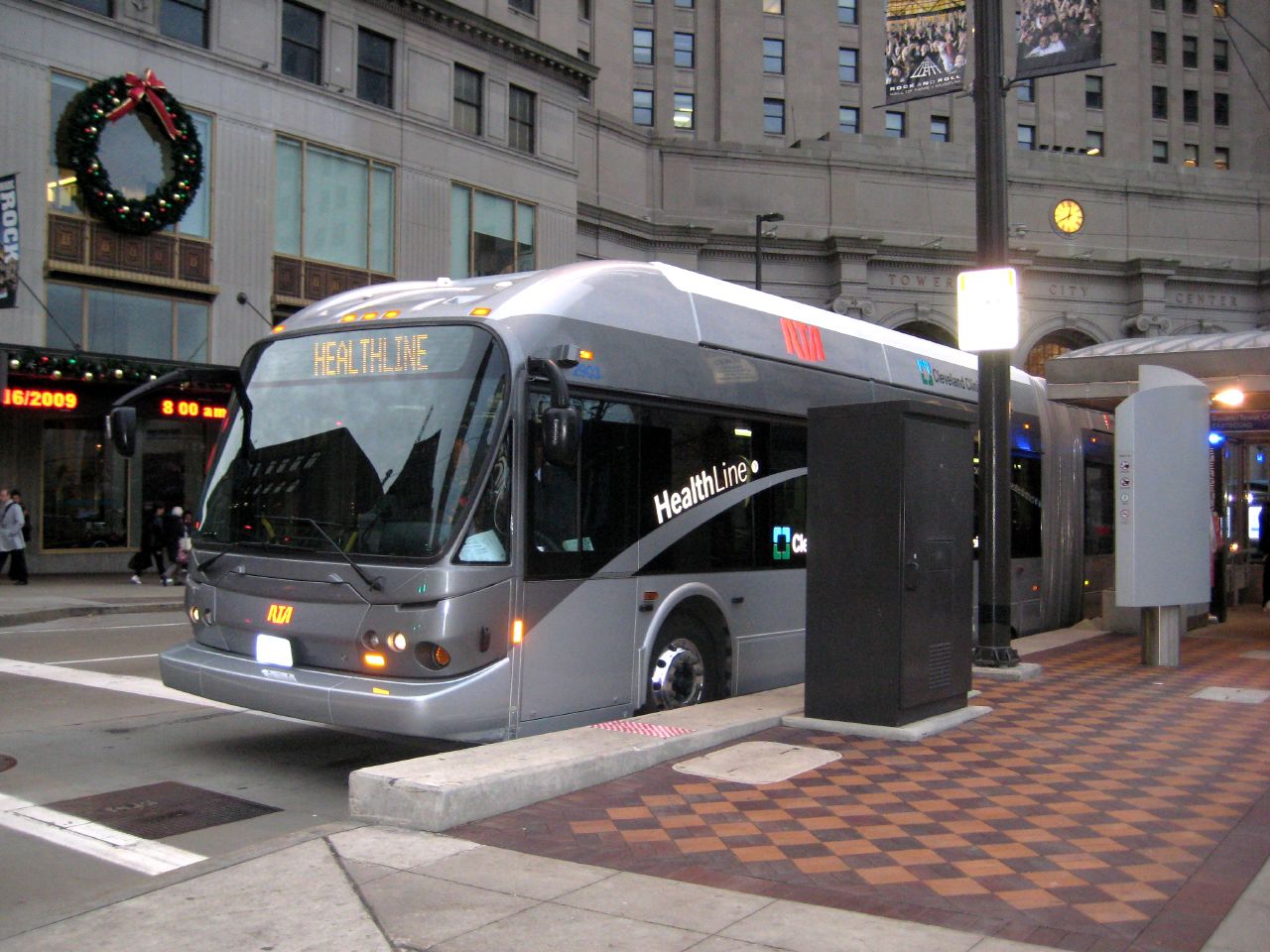A Cleveland municipal court judge has ruled that transit police violated passengers' constitutional rights when conducting fare enforcement on the HealthLine, the city's much-lauded BRT route.
The decision will slow down the boarding process on the HealthLine for now, but Judge Emanuella Groves laid out a clear way to fix the problem and retain fast boarding procedures: Stop checking fares with law enforcement officers and start using civilian inspectors instead.
The HealthLine is a model for rapid bus service in the U.S. Along with design features like center-running bus lanes, the service moves faster because fares are collected via proof-of-payment. Instead of everyone lining up at the front door to pay one by one, HealthLine passengers pay for a ticket before boarding and enter at any door.
To keep people honest, the Greater Cleveland Regional Transit Authority uses police officers to conduct random stops and check for fare cards.
The case before Groves involved an East Cleveland man charged with fare evasion, a fourth-degree misdemeanor. Ronnie Williams was arrested in July after two police officers boarded a HealthLine bus and demanded all passengers show proof of payment. When Williams could not produce a fare card, he was forcibly removed from the bus and issued a citation. He maintained that he could not purchase a fare card because of a malfunctioning machine and paid the bus driver. He was found not guilty.
It was hardly the first time that RTA's fare enforcement practices have been called into question.
A 2010 study by the ACLU found a pattern of racial bias in stops by RTA police officers aboard the HealthLine. Nine out of 10 passengers stopped were black. RTA has since moved toward handling first-time fare evasion cases outside of criminal court, issuing $25 civil fines.
Many jurisdictions are decriminalizing fare evasion altogether and shifting entirely to civil fines. But in Cleveland, officers retain the option of charging a criminal misdemeanor, like they did against Williams.
In her opinion [PDF], Groves said stopping a specific passenger who was reasonably suspected of evading the fare would be permissible. But subjecting every person on board the bus to a search by law enforcement officers is unconstitutional:
Passengers should be left alone, in their private thoughts and spaces, as they travel to their destinations, until individualized, reasonable, articulable suspicion establishes that a specific passenger has committed the offense of fare evasion.
Groves also ruled that the mere absence of a fare card is not sufficient proof of fare evasion "because no evidence showed that Defendant acted recklessly by deceiving or eluding payment."
Crucially, Groves' opinion did not rule proof-of-payment unconstitutional. If fare inspections were not conducted by police, she said, they would not violate passengers' rights:
If RTA utilized non-law enforcement officers, a constitutional analysis would be unnecessary. The utilization of police officers inappropriately removes the “middleman” or buffer between police and passengers. There must be an intermediary between police and passengers to prevent arbitrary and abusive police encounters.
This passage points the way toward a better proof-of-payment system, less subject to dangerous escalation. It would be more akin to parking enforcement, which is conducted as a civil action through uniformed, unarmed traffic officials, not police officers. There is no reason fare evasion should be policed by armed law enforcement officers.
RTA spokesperson Linda Krecic told Streetsblog that fare evasion along the HealthLine is not unusually high: between 3 and 5 percent, similar to other routes around the country that use proof-of-payment.
She said the agency “is considering its next steps” and “reviewing the impact of the decision.” RTA is now using a combination of station-based inspections carried out by law enforcement and bus-based inspections conducted by drivers. “We are reviewing the way we collect fares and testing this method,” she told Streetsblog.
The station-based approach still involves police. Since they can observe people using the ticket-vending machines, it circumvents the legal issue about unreasonable search. The bus-based inspections are similar to standard bus fare payment in American cities -- every passenger lines up at the front door to show the driver a ticket.
Early reports from HealthLine riders indicate that this has made service significantly slower:
Second rider, can confirm: SLOWWWWWWWWWWWWWW. @SceneSallard https://t.co/5G6Q9wAd00
— Jeffrey Weston Sleasman 🔰 (@jeffsleasman) October 31, 2017
Taking a cue from Groves, Clevelanders for Public Transit is calling on the RTA to decriminalize fare evasion, drop police enforcement of bus fares, and use unarmed civilian inspectors instead. With a saner system of fare enforcement, they say, RTA could then expand proof-of-payment citywide, saving bus riders time on every route.






